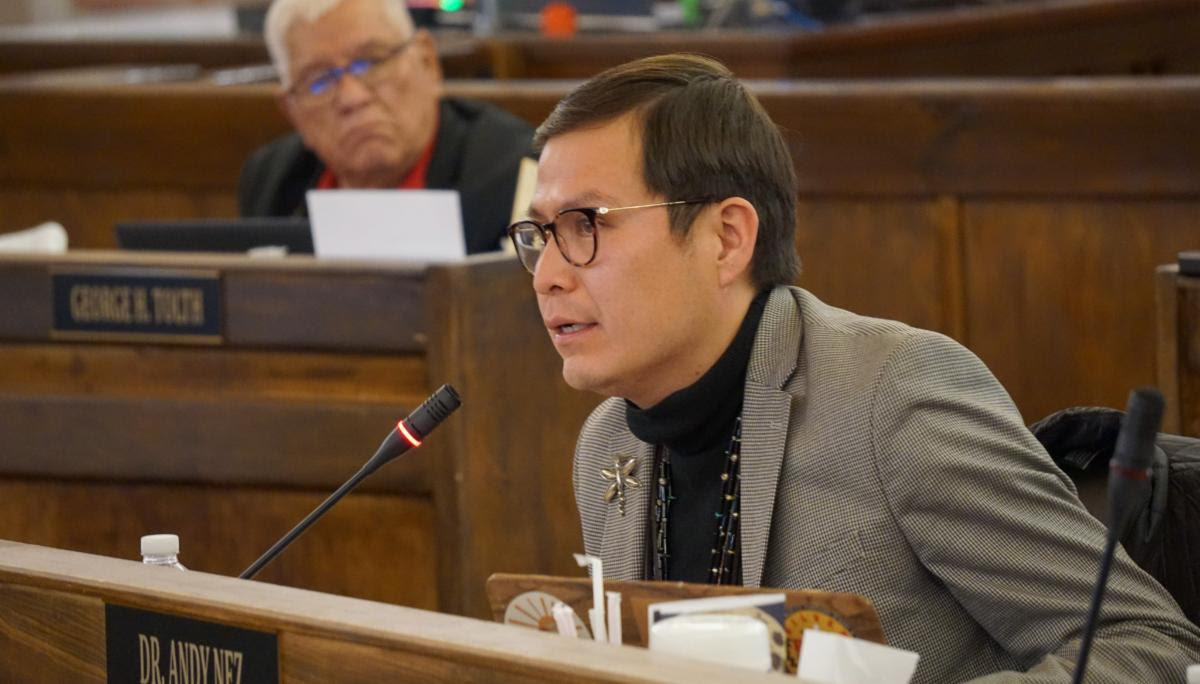
- Details
- By Native News Online Staff
On April 21, the 25th Navajo Nation Council passed legislation opposing Executive Order 14191, a federal directive issued by former President Donald Trump that encourages the use of federal education funds—including Bureau of Indian Education (BIE) resources—for private, charter, and religious schools.
Sponsored by Delegate Dr. Andy Nez, Legislation No. 0057-25 argues that the order was issued without meaningful consultation with tribal nations and threatens both the sovereignty of the Navajo Nation and the future of BIE-funded schools.
Executive Order 14191, titled “Expanding Educational Freedom and Opportunity for Families,” instructs the U.S. Secretary of the Interior to explore ways to divert federal education funding to non-BIE institutions and submit a plan within 90 days. The Navajo Nation contends that this directive disregards the federal government’s trust and treaty responsibilities—outlined in the Treaties of 1849 and 1868—to provide education for Navajo children in a manner that respects and upholds tribal sovereignty.
“This order undermines the trust responsibility guaranteed in our treaties and poses a threat to community schools that this administration fails to visit,” said Delegate Dr. Andy Nez. “Our schools are already under-resourced, and many serve as the only educational institution for students; diverting funds will only widen those gaps.”
The legislation highlights serious concerns about diverting federal education funds away from Bureau of Indian Education (BIE) schools—many of which are located in remote areas where students have no practical alternatives. It points out that 31 of the 66 BIE-funded schools on the Navajo Nation are in rural, broadband-limited regions, making school choice policies both unfeasible and potentially harmful to Navajo students.
“Our students deserve stability, not policies that risk school closures or reduced services in rural and underserved areas,” said Delegate Vince James.
The measure reaffirms the Navajo Nation’s government-to-government relationship with the United States and its treaty rights, formally opposing school choice initiatives that bypass tribal consultation or threaten BIE funding. It calls for increased consultation with the U.S. Department of Education and the Bureau of Indian Education and authorizes the Navajo Nation President, Vice President, and Speaker to take all necessary actions to defend the Nation’s interests at the federal level.
As the final authority, the 25th Navajo Nation Council passed Legislation No. 0057-25 under the consent agenda, with 18 votes in favor and none opposed.
More Stories Like This
Hanging a Red Dress for Christmas: MMIP, Native Higher Education, and Hope for a Better New YearNative Students Can Win $5,000 Scholarship, International Distribution in Pendleton Design Contest
American Indian College Fund Raises Alarm Over Plan to Shift Native Programs Away From the Dept. of Education
MacKenzie Scott Foundation Gives $5 Million Contribution to Little Priest Tribal College
Tribal Leaders Push Back on Dismantling of U.S. Department of Education
Help us defend tribal sovereignty.
At Native News Online, our mission is rooted in telling the stories that strengthen sovereignty and uplift Indigenous voices — not just at year’s end, but every single day.
Because of your generosity last year, we were able to keep our reporters on the ground in tribal communities, at national gatherings and in the halls of Congress — covering the issues that matter most to Indian Country: sovereignty, culture, education, health and economic opportunity.
That support sustained us through a tough year in 2025. Now, as we look to the year ahead, we need your help right now to ensure warrior journalism remains strong — reporting that defends tribal sovereignty, amplifies Native truth, and holds power accountable.
 The stakes couldn't be higher. Your support keeps Native voices heard, Native stories told and Native sovereignty defended.
The stakes couldn't be higher. Your support keeps Native voices heard, Native stories told and Native sovereignty defended.
Stand with Warrior Journalism today.
Levi Rickert (Potawatomi), Editor & Publisher


